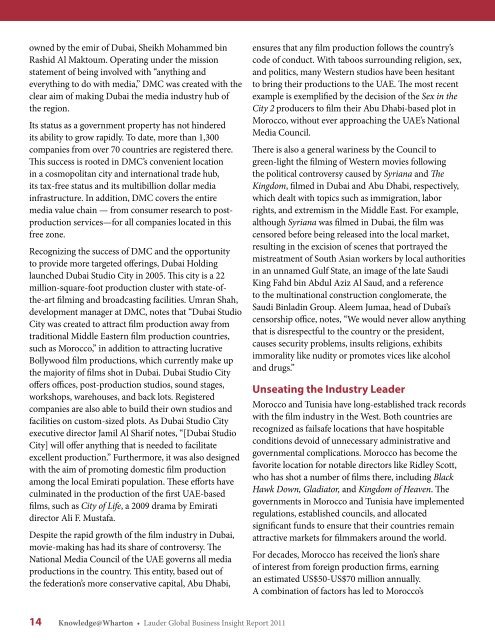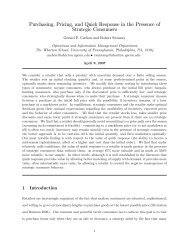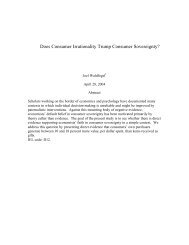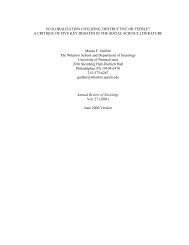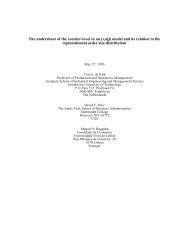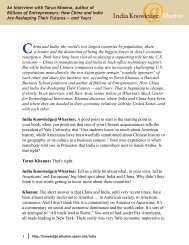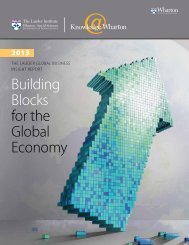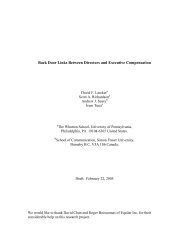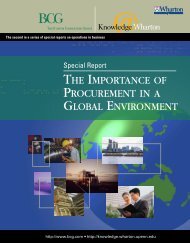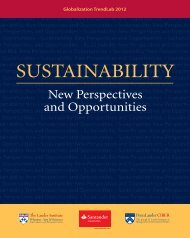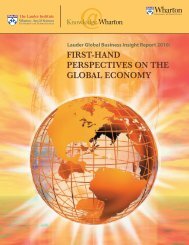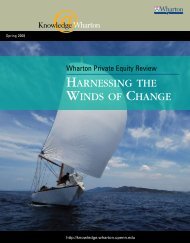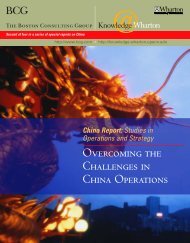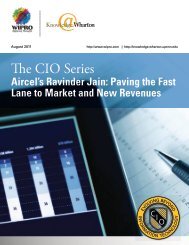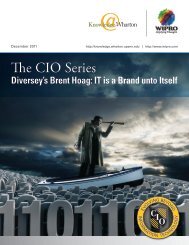The Lauder Global Business Insight Report 2011 - Knowledge ...
The Lauder Global Business Insight Report 2011 - Knowledge ...
The Lauder Global Business Insight Report 2011 - Knowledge ...
You also want an ePaper? Increase the reach of your titles
YUMPU automatically turns print PDFs into web optimized ePapers that Google loves.
owned by the emir of Dubai, Sheikh Mohammed bin<br />
Rashid Al Maktoum. Operating under the mission<br />
statement of being involved with “anything and<br />
everything to do with media,” DMC was created with the<br />
clear aim of making Dubai the media industry hub of<br />
the region.<br />
Its status as a government property has not hindered<br />
its ability to grow rapidly. To date, more than 1,300<br />
companies from over 70 countries are registered there.<br />
This success is rooted in DMC’s convenient location<br />
in a cosmopolitan city and international trade hub,<br />
its tax-free status and its multibillion dollar media<br />
infrastructure. In addition, DMC covers the entire<br />
media value chain — from consumer research to postproduction<br />
services—for all companies located in this<br />
free zone.<br />
Recognizing the success of DMC and the opportunity<br />
to provide more targeted offerings, Dubai Holding<br />
launched Dubai Studio City in 2005. This city is a 22<br />
million-square-foot production cluster with state-ofthe-art<br />
filming and broadcasting facilities. Umran Shah,<br />
development manager at DMC, notes that “Dubai Studio<br />
City was created to attract film production away from<br />
traditional Middle Eastern film production countries,<br />
such as Morocco,” in addition to attracting lucrative<br />
Bollywood film productions, which currently make up<br />
the majority of films shot in Dubai. Dubai Studio City<br />
offers offices, post-production studios, sound stages,<br />
workshops, warehouses, and back lots. Registered<br />
companies are also able to build their own studios and<br />
facilities on custom-sized plots. As Dubai Studio City<br />
executive director Jamil Al Sharif notes, “[Dubai Studio<br />
City] will offer anything that is needed to facilitate<br />
excellent production.” Furthermore, it was also designed<br />
with the aim of promoting domestic film production<br />
among the local Emirati population. <strong>The</strong>se efforts have<br />
culminated in the production of the first UAE-based<br />
films, such as City of Life, a 2009 drama by Emirati<br />
director Ali F. Mustafa.<br />
Despite the rapid growth of the film industry in Dubai,<br />
movie-making has had its share of controversy. <strong>The</strong><br />
National Media Council of the UAE governs all media<br />
productions in the country. This entity, based out of<br />
the federation’s more conservative capital, Abu Dhabi,<br />
14 <strong>Knowledge</strong>@wharton • <strong>Lauder</strong> <strong>Global</strong> <strong>Business</strong> <strong>Insight</strong> <strong>Report</strong> <strong>2011</strong><br />
ensures that any film production follows the country’s<br />
code of conduct. With taboos surrounding religion, sex,<br />
and politics, many Western studios have been hesitant<br />
to bring their productions to the UAE. <strong>The</strong> most recent<br />
example is exemplified by the decision of the Sex in the<br />
City 2 producers to film their Abu Dhabi-based plot in<br />
Morocco, without ever approaching the UAE’s National<br />
Media Council.<br />
<strong>The</strong>re is also a general wariness by the Council to<br />
green-light the filming of Western movies following<br />
the political controversy caused by Syriana and <strong>The</strong><br />
Kingdom, filmed in Dubai and Abu Dhabi, respectively,<br />
which dealt with topics such as immigration, labor<br />
rights, and extremism in the Middle East. For example,<br />
although Syriana was filmed in Dubai, the film was<br />
censored before being released into the local market,<br />
resulting in the excision of scenes that portrayed the<br />
mistreatment of South Asian workers by local authorities<br />
in an unnamed Gulf State, an image of the late Saudi<br />
King Fahd bin Abdul Aziz Al Saud, and a reference<br />
to the multinational construction conglomerate, the<br />
Saudi Binladin Group. Aleem Jumaa, head of Dubai’s<br />
censorship office, notes, “We would never allow anything<br />
that is disrespectful to the country or the president,<br />
causes security problems, insults religions, exhibits<br />
immorality like nudity or promotes vices like alcohol<br />
and drugs.”<br />
unseating the Industry Leader<br />
Morocco and Tunisia have long-established track records<br />
with the film industry in the West. Both countries are<br />
recognized as failsafe locations that have hospitable<br />
conditions devoid of unnecessary administrative and<br />
governmental complications. Morocco has become the<br />
favorite location for notable directors like Ridley Scott,<br />
who has shot a number of films there, including Black<br />
Hawk Down, Gladiator, and Kingdom of Heaven. <strong>The</strong><br />
governments in Morocco and Tunisia have implemented<br />
regulations, established councils, and allocated<br />
significant funds to ensure that their countries remain<br />
attractive markets for filmmakers around the world.<br />
For decades, Morocco has received the lion’s share<br />
of interest from foreign production firms, earning<br />
an estimated US$50-US$70 million annually.<br />
A combination of factors has led to Morocco’s


